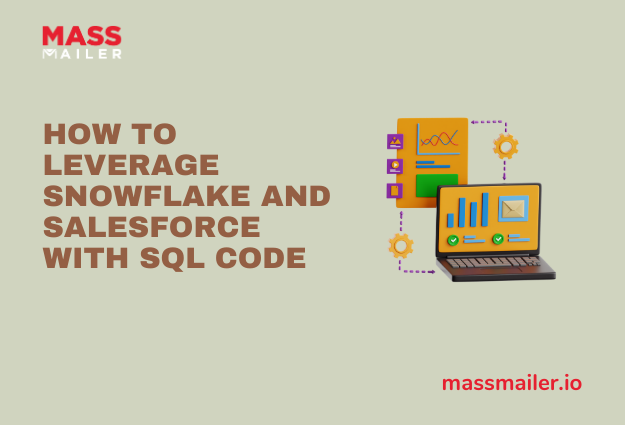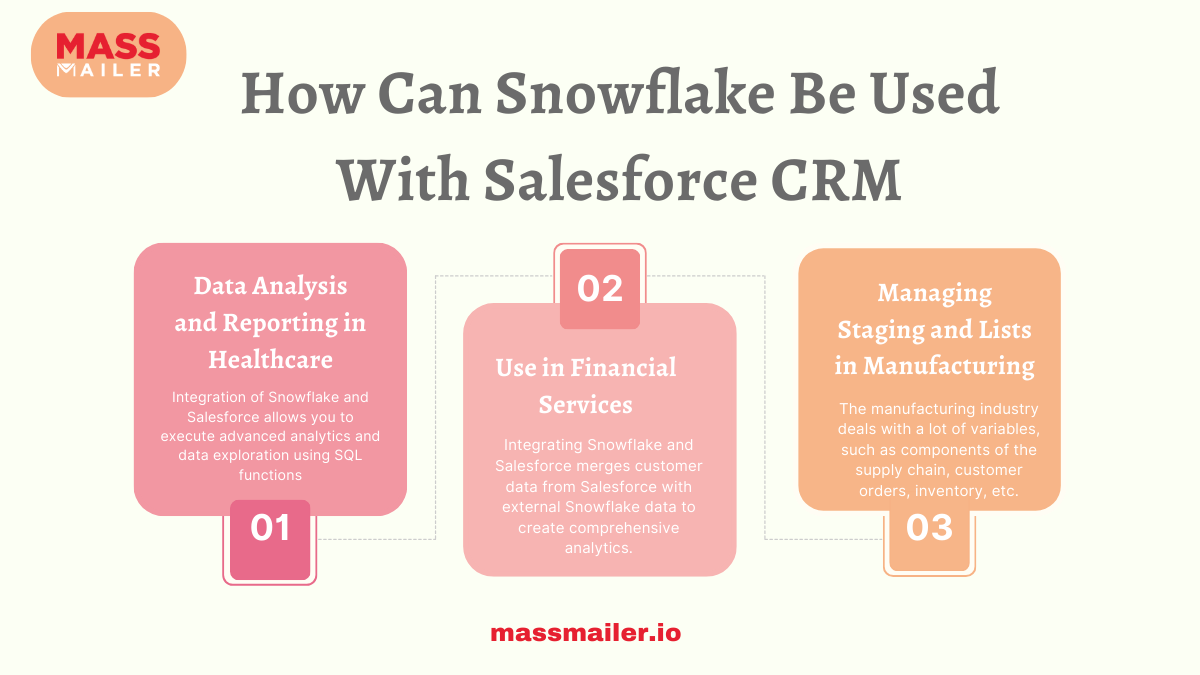How to Leverage Snowflake and Salesforce With SQL Code
If you are an organization that utilizes Salesforce tools and features, you know that it creates a large volume of data that you must store in the Salesforce Data Cloud. The Salesforce CRM does provide handy functions that enable you to manage this data well.

Having said that, there are better ways to gain more control over your data warehouse structures through an integration between Snowflake and Salesforce. Powered by robust SQL functions, it is possible to drastically streamline data workflows and perusal in the data lakes of your organization.
This blog will help you understand Snowflake, how integration helps, the use cases, and how SQL resources can be leveraged to create useful data functions.
What is Snowflake?
Snowflake (developed in 2012) is a Software as a Service platform that is fully managed. It provides features like data warehousing, data lakes, and data functions like engineering, science, application development, and more.
It can also be leveraged for other functions, such as storage and computing, data sharing and cloning, etc.
There are three major components that Snowflake provides to organizations:
- Cloud services based on ANSI SQL
- Query processing over virtual cloud data warehouses
- Database storage
When it comes to managing Salesforce data for better access and functionality, Snowflake can widen the avenues and make tasks simpler through SQL querying.
Why is Snowflake and Salesforce Integration Advantageous?
To start, it is possible to expand the already robust Salesforce CRM analytics into more powerful data warehousing and analytics capabilities using Snowflake integrations.
Given that the integration is native, it is possible to leverage the existing investments without shifting things too much while still increasing the ambit of the native functions. All this with direct access to Snowflake from Salesforce interfaces.
Additionally, the process of setting up Snowflake in Salesforce is simple and straightforward, much like setting up an account. The computational resources that you use from Snowflake can be paid for individually, making it a low-cost option.
Leveraging Snowflake for Salesforce Data Cloud Using SQL
Snowflake and Salesforce integration provides you with opportunities to achieve data transformation using simple methods. Let’s go over some key functions of data transformation that you can perform from Salesforce on Snowflake using SQL.
1. Case Statements
With a view to reduce errors in the dataset and expand the insight into it, Salesforce provides users with an excellent numeric binning function. In Snowflake, you can achieve the same objective using a standard function called “WIDTH_BUCKET” if you wish to quickly analyze the distribution of values in a dataset based on the amount.
The SQL query is represented as follows:
WIDTH_BUCKET( <expr> , <min_value> , <max_value> , <num_buckets> )
2. Calculation of Differences in Dates and Their Addition
You may need to calculate the difference in dates or add them up to determine the age of your customers or for warranty determination purposes. Snowflake provides an extremely easy method to calculate the time and date differences through Salesforce.
The SQL function for the same is represented as follows:
DATEDIFF( <date_or_time_part>, <date_or_time_expr1>, <date_or_time_expr2> )
If you wish to add up the dates, you can use the following SQL function:
DATEADD(<date_or_time_part>, <value>, <date_or_time_expr> )
3. Converting Time Zones
The Salesforce platform stores data in Coordinated Universal Time (UTC), which may necessitate you to convert your user data into the correct time zone before it can be processed for analytics.
Using Snowflake, you can easily use the “CONVERT_TIMEZONE” function to apply to the chosen dataset. The SQL function is represented as below:
CONVERT_TIMEZONE(‘UTC’, ‘America/Los_Angeles’, “CreateDate”) “Local TZ Create Date”
This will convert the timestamps on the dataset to Los Angeles time.
How Can Snowflake Be Used With Salesforce CRM?

There are several extremely functional use cases that emerge from integrating Snowflake and Salesforce. Three of the major use cases are discussed below:
1. Data Analysis and Reporting in Healthcare
Integration of Snowflake and Salesforce allows you to execute advanced analytics and data exploration using SQL functions. This is especially helpful in the Healthcare sector where there are strict regulations about patient PII.
You can derive advanced analytics on anonymized data that is sourced from various systems and sources on your network. This is pivotal for enhancing the quality of customer service that your enterprise can provide since it adds more dimensions to the existing data.
2. Use in Financial Services
Financial Services sector deals with a lot of confidential and sensitive information that belongs to customers on a daily basis. Integrating Snowflake and Salesforce brings together the anonymized customer data in Salesforce and external data housed on Snowflake to generate holistic analytics.
This enables you to create a clearer picture of market trends and customer dynamics while also remaining fully compliant with financial privacy laws and regulations. These insights can also help you design novel financial products.
3. Managing Staging and Lists in Manufacturing
The manufacturing industry deals with a lot of variables, such as components of the supply chain, customer orders, inventory, etc. The combined capacity of Snowflake and Salesforce can unlock advanced staging functionality for managing such data lists.
It provides a more sophisticated and complex analysis of manufacturing operations than Salesforce reporting can innately provide. As manufacturing scales up, this integration becomes even more useful.
MassMailer: More Power for Salesforce
Salesforce CRM is a thoroughly capable platform in itself. However, sometimes it benefits an enterprise more to expand its features and functionality a little more to derive that extra insight to stay ahead of the competition.
Snowflake and Salesforce integration provide that extra mile to enterprises, with very little effort but many additional benefits.
If you wish to derive even more value from your Salesforce installation, consider leveraging the bulk email power of MassMailer.
MassMailer is a Salesforce-native bulk emailing solution that lets you run Salesforce email campaigns, build and schedule stunning emails, and track email metrics natively through a Salesforce dashboard.
Visit the website to understand MassMailer in greater detail.
